The Rohingya Refugees in Malaysia and Bangladesh
By Li Wen Jie (李文傑)
Photo by Li Wen Jie (李文傑)
Abridged and translated by Shawn Chang (張牧軒)
Rosalind Chang (張薰云)
Tzu Chi has been working closely with UNHCR to tackle the Rohingya refugee crisis, and provides free medical service, education, and cash aid to Rohingya refugees in need.
I've been handling refugee issues at Tzu Chi's branch in Malaysia for 12 years, so I can deeply understand the hardship refugees are going through. The recent issue of the Rohingya people made me wish all the more to visit Kutupalong refugee camp, the biggest Rohingya refugee camp in Bangladesh.
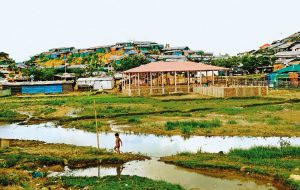
Kutupalong refugee camp is located on the border of Bangladesh and Myanmar. In the rainy season, it's muddy everywhere. Refugees live in very poor conditions, and they don't know when they'll be able to go home.
Over a Million of Rohingya People in the Refugee Camp
Even though I've seen many videos about the refugee camp before I came here, I was still shocked when I saw the endless rows of tents in the refugee camp. The official statistics provided by the Bangladesh government and UNHCR state that there are about 900,000 refugees residing in this camp, but according to unofficial statistics,
the actual number of refugees has reached over one million.
Local government and international aid organizations have developed a way to manage the refugee camp. They hire refugees in the camp to build or improve infrastructures, plant trees, etc., and they resettle refugees living in dangerous areas that are prone to flooding or landslides first. The employment of many refugees has prompted commercial activities to flourish in the refugee camp.
There are 60,000 to 70,000 women who get pregnant in the refugee camp every year, and around 5,000 infants are born each month. There are as many as 13,000 orphans in the refugee camp, who are possibly the results of unhappy marriages or the raping of female refugees.
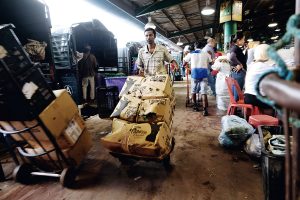
A Rohingya man working as a porter in Pasar Borong Selayang.
Refugees Hidden in the Cities
12 years ago, when I first began to investigate the refugees' needs for medical care and education in Kuala Lumpur, I even doubted that refugees and refugee camps existed there. The closing of Sungai Besi Refugee Camp in the 90's should have marked the end of refugees residing in Malaysia. What I didn't realize was that many illegal foreign immigrants were already living in the cities of Malaysia, especially in Kuala Lumpur and also along the Klang River.
In the busiest commercial areas, such as Bukit Bingtang and Pudu, most refugees are from Chin and the Kachin ethnic groups, and are Christian Burmese. Rohingya people, who came from western Myanmar, mostly gathered in Selayang and Ampang along with other Burmese Muslims.
Due to their refugee status, Rohingya children can't receive formal education, and neither can Rohingya people be legally employed. So, they have little choice but to do 3D (Difficult, Dangerous, Dirty) jobs or collect recyclables to earn a meager income and try to make do. That's why most of them are malnourished. Also, if they fall sick, rarely do they seek medical treatment as they either can't afford the cost or are afraid of being arrested.
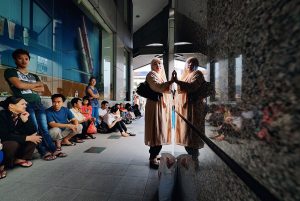
People waiting in line for the opening of Tzu Chi's free clinic.
The Free Clinic of Tzu Chi
In a building located in downtown Kuala Lumpur, although it is still early in the morning and the free clinic is not open yet, a group of refugees from various parts of Asia and Africa are already waiting in a line.
The free clinic is open for service six days a week, providing medical services to around 150 people a day. The free clinic provides dental service, physical therapy, psychotherapy and other medical services for free, allowing refugees to receive the medical service they need in this foreign place.
Stories of Rohingya People
Hanif is a 21-year-old Rohingya man who came to Malaysia with his parents when he was 8 years old. Back then, his father supported his family by selling the recyclables he collected. Hanif enrolled at Tzu Chi's refugee school, and after graduating from elementary school at age 16, he also took up collecting recyclables and remained impoverished. However, at age 19, he became an interpreter at Tzu Chi's free clinic and began to have a steady income, which enabled him to finally turn his life around and provide for his family. Hanif's story is proof that education and knowledge can help lift refugee children out of poverty and have a bright future.
When asked about his home country, Hanif admitted that his memory about his homeland was vague. He never personally witnessed the war back in his homeland, and everything he knew came from words of his relatives and friends. He doesn't wish to ever return to Myanmar. Instead, his biggest dream is that Malaysia will accept him as a citizen one day. Many Rohingya people have the same wish, as they view Malaysia as their homeland after they have been living here for so long.
Mohd Rafiq has lived in Malaysia for over ten years. Originally, he worked as a translator for the United Nations, but later became a teacher for English and math at an education center. Compared with working as a translator, the stable income of being a teacher has greatly improved the quality of his family's living standards. I didn't ask him how he got here, but he told me the story of how he once tried to illegally enter Singapore.
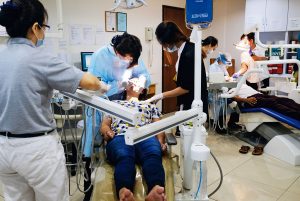
The free clinic provides free dental service to its patients.
Initially, his destination was Singapore, and Malaysia was just a place he stayed temporarily during the journey. He worked at Johor Bahru, and after waiting for several years, he finally got the chance to go to Singapore. He and other illegal immigrants hid in a factory for a few days, then a vehicle took them through a swampy forest. After getting off the vehicle, they boarded a sampan (a flat-bottomed wooden boat) which was very crowded, and he didn't know how much time passed before the sampan reached the shore. They hid in another factory-like building for several days, then a truck picked them up and left them on a street.
After hiding, sleeping on the street, starving, and being unable to find a job for two weeks, he began to regret going to Singapore. He eventually decided to turn himself in to the police. After being held in custody for a month, the authorities sent him back to a harbor on the southern shore of Myanmar. However, Mohd Rafiq soon escaped to Malaysia again. Perhaps, all the Rohingya people want is to be in a Muslim society that will accept them, and Malaysia is the ideal destination for many of them.
Providing Medical Care to the Refugees
Starting from 2006, Tzu Chi began to hold free clinics once a month in the Imbi area of Kuala Lumpur, a place where many refugees reside. Nowadays, Tzu Chi has established a well-equipped free clinic to serve refugees in need of medical attention.
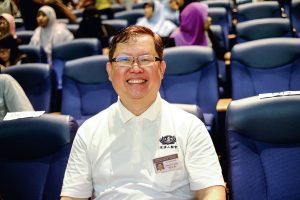 Over 20 years ago, doctor Fu Zhi Liang (符之良) saw that many refugees who came to the free clinic had chronic diseases and needed comprehensive medical care, so he quitted his originally high-paying job and became the medical director and a full-time doctor of Tzu Chi's free clinic.
Over 20 years ago, doctor Fu Zhi Liang (符之良) saw that many refugees who came to the free clinic had chronic diseases and needed comprehensive medical care, so he quitted his originally high-paying job and became the medical director and a full-time doctor of Tzu Chi's free clinic.
After becoming the medical director of the free clinic, he began to promote making appointments with doctors beforehand and encouraged refugees to return for a follow up.
"Refugees don't have identity documents, and are very poor. Most of them lack general knowledge regarding hygiene and healthcare, and are impoverished. That's why they often don't go to a doctor when they're sick, and let their diseases continue to worsen. In the past, I was selfish. I only wanted to work in a private hospital and make a lot of money, but afterwards, I thought, 'What's the point of making so much money? Staying at the free clinic to improve its operation and benefit more people will be more meaningful.' " That was why Dr. Fu Zhi Liang decided to work full time in the free clinic.
In UNHCR's plan, psychotherapy is also a part of the medical service that needs to be provided to the refugees, as many refugees suffered psychological disorders due to stress.
"Among the patients, people from the Middle East are mostly well educated, some Afghans are deliberate and know how to demand for better treatment and the Chin people will help one another out and they also tend to let things go easily. In contrast, the Rohingya people can't express their feelings easily due to the language barrier, and they are too shy to talk about some personal experiences. So, we need to treat them with empathy and put ourselves in their shoes while listening to them," said Huang Shi Yun(黃詩筠), a psychotherapist at the free clinic. She also said that many female Rohingya refugees are victims of gang rape, sexual abuse or child marriages.
Refugees' homelands are ravaged by war. Yet, after arriving in Malaysia, they still need to cope with the stress of migrating to foreign locations and face the risks of violence, sexual abuse, or exploitation. Huang Shi Yun established a booking system for refugees with emotional, psychological, or mental problems, aiming to help them get better by intense and regular therapeutic sessions.
Education as the Key to Get Out of Poverty
Since Tzu Chi became an Implementing Partner of UNHCR in 2007, it conducted a survey among Burmese Muslims and the Rohingya people in several areas of Kuala Lumpur in order to provide preschool education to the children of refugees.
Eventually, five UNHCR & Tzu Chi Education Centers are established in five Rohingya communities. Initially, those centers were run by the communities themselves, but due to many reasons, two of them were eventually handed over to local Islamic organizations, and the other three are now run by Tzu Chi, including a school named Madrasha Hashimiah, to which Tzu Chi has been providing financial aid since 2004.
The principal of this school, Ustaz Hashim Bin Kassim, was originally a porter at a market. As a Muslim, he didn't want to see the children of his fellow countrymen wander around with nothing to do, so he began to volunteer as a teacher and teach them Islamic religious etiquette, and later established Madrasha Hashimiah.
There are currently 250 students in this school, and the Rohingya people make up the largest part of them. In addition to its main focus on the Quran, it also teaches English, Malaysian Language, and mathematics. Since 2006, Tzu Chi also began to teach the students there Jing Si Aphorisms, and in the last two years, teachers of Tzu Chi Teacher's Association began to teach them Chinese.
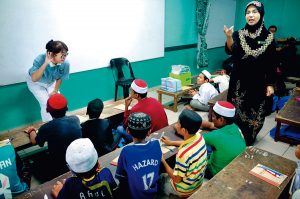
Zheng Mei Ling, a teacher who is a member of Tzu Chi Teacher's Association, said, "Being able to speak one more language will give them a better opportunity to land a job in the future. Moreover, many of their parents' employers are Chinese, so speaking Chinese will bring them many advantages in the future."
In the other two schools run by Tzu Chi, Harmony School and Unity School, students are mostly Rohingya people. Besides teaching them academic subjects, teachers also need to pay attention to character education. They also need to face many challenges caused by the students' refugee status, such as high absence rates or the parents' indifference to the importance of their children's academic education, etc.
Humanitarian Aid that Transcend Religious Boundaries
Sahidah is a refugee who has lived in Malaysia for over 30 years. She has diabetes, but can't afford to go to hospitals or clinics. The agony caused by the disease even makes her unable to sleep at night. She is very grateful that even though Tzu Chi is a Buddhist organization, it is still willing to provide free healthcare and medicine to the Rohingya people.
Tzu Chi is now working with UNHCR to carry out a program named Cash-Based Interventions (CBI). This program aims to provide financial support to refugees who have lost their source of income or are facing severe crises. As there were too many refugees and not enough manpower, UNHCR decided to let Tzu Chi take part in interviewing refugees that may need financial aid and also in assessing whether they're eligible for the program.
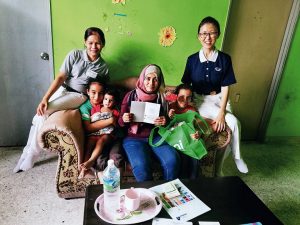
In the Cheras area of Kuala Lumpur, Tzu Chi volunteers visited Arsyad, one of the aid recipients of the Cash-Based Intervention program. He is unable to stand up due to liver failure and kidney failure, and his older sister now tends to his daily needs. She used to work in Ipoh, but after her brother fell ill, she came to Kuala Lumpur to care for him.
The Challenge of Malaysia's Refugee Crisis
Since the Rohingya people began to flock into Malaysia in 2015, the number of refugees in Malaysia has increased rapidly. Short-term humanitarian aid can only help ease the problem, but can't really solve it.
To the Malaysian government, the extent of the religious and social impact the increasing number of refugees may cause still remains to be seen. However, along with the medical and educational aid, the services Tzu Chi has been providing to the refugees seem to shine a ray of hope upon this seemingly endless refugee crisis.
Contact Us | Plan a Visit | Donate
8 Lide Road, Beitou 11259, Taipei, Taiwan
886-2-2898-9999
005741@daaitv.com
©Tzu Chi Culture and Communication Foundation
All rights reserved.
